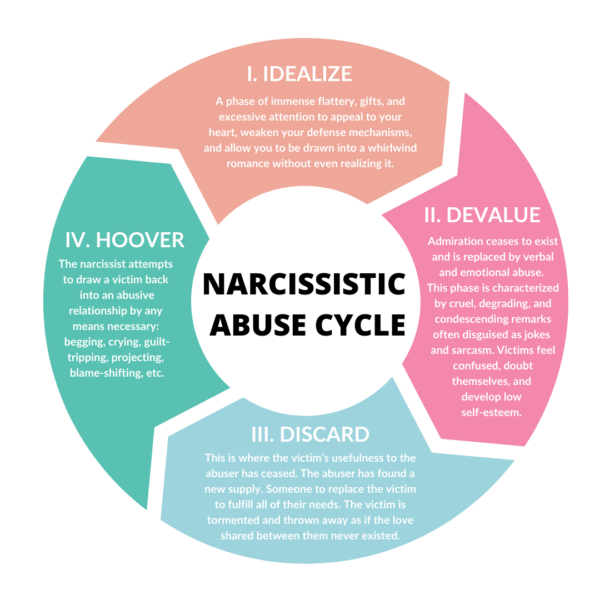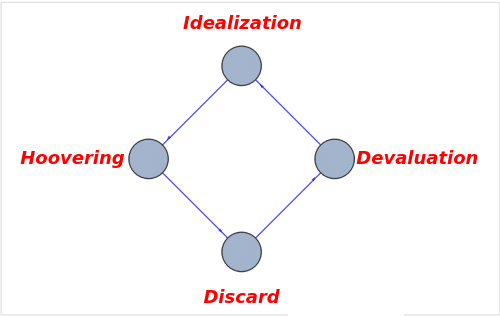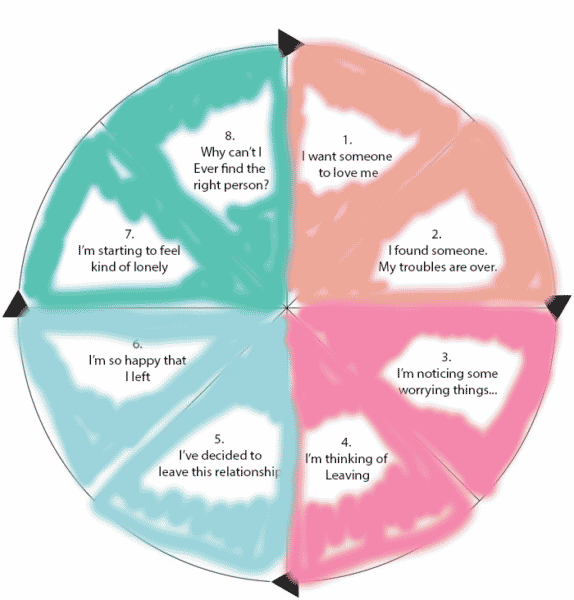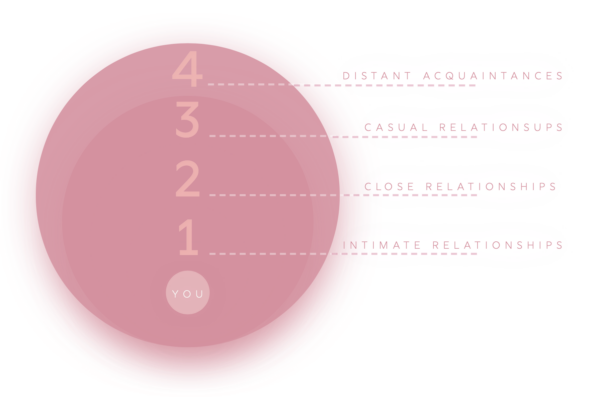Today I’d like to talk about the six different ways that a narcissist will treat their ex.
Namely you can expect a narcissist to:
- Stay friends with an ex
- Cycle you through the narcissistic abuse cycle
- Create a hoover supply rolodex
- Protect their false self by blaming you
- Paint you as a phantom ex
- Refuse to hoover if you mortified them
A part of me is really hoping that you have no idea what any of those things are because it means we’re going to have one heck of a time learning about them.

What Are Your Chances of Getting Your Ex Boyfriend Back?
Take the quizWay #1: Staying Friends With Their Ex
Not many people consider this, but a common way narcissists treat their exes is by attempting to remain friends with them.
This concept was recently highlighted in an article from Vice, of all places.
They interviewed Dr. Tony Ferretti, a renowned expert on narcissism, who argued that narcissists detest failure or loss. So, if a narcissist was broken up with, they’d strive to maintain some form of connection. They endure a kind of injury when rejected by a partner and struggle with both moving on and healing from it.
I actually found myself disagreeing with a point made by Dr. Ferretti.
It’s possible he was misquoted, I myself was interviewed by Vice back in 2019 and so I know that sometimes things can be taken out of context.
But it almost seemed as if Dr. Ferretti was making the point that the only way a narcissist will “be friends” with an ex is if that ex broke up with them.
I’d like to argue that isn’t always the case.
In fact, recent research, specifically a study conducted by Oakland University researchers Justin Mogliski and Lisa Welling, sheds light on the individuals who choose to stay friends with their exes.
They asked 860 subjects to list their motivations for maintaining ties with their exes. The study revealed that subjects with dark personality traits were more likely to keep relationships with their exes for practical or sexual reasons.
This aligns with our understanding of narcissists.
They often stay friends with an ex because they require something for their ‘supply’.
I’ll elaborate on this ‘supply’ concept shortly because it’s a HUGE point but this led me to ponder – how frequently do narcissists maintain friendships with their exes?
How Common Is It?
To be honest, I couldn’t find any legitimate research even looking at this exact area beyond what I’ve already mentioned.
So, we’re somewhat left to rely on our own assumptions or understanding.
Take what I’m about to say with a massive grain of salt.
I personally believe that the most likely behavior you’re going to witness from a narcissist, particularly immediately following a breakup, is complete disregard. They’ll exhibit avoidant behavior towards you.
Then, there will be a sudden resurgence where they express a desire to be friends, which is similar to what we’ve often observed in the Hoover stage.
Let’s talk a bit about that.
Way #2: They’ll Run You Through The Narcissistic Abuse Cycle
If you’re not familiar, there’s a widely-circulated graphic on the internet that describes what is known as the narcissistic abuse cycle.

What Are Your Chances of Getting Your Ex Boyfriend Back?
Take the quizThough to be contrarian I created our own,
(Theirs is probably better but mine is simple and sometimes simple stuff wins…. Oh who am I kidding.)
This cycle has four distinct parts:
- The Idealization Stage: Often referred to as the honeymoon stage, where the narcissist places you on a pedestal. This stage leaves you feeling intoxicated, consumed, and excited. It’s full of hope and potential.
- The Devaluation Stage: The narcissist starts to lose interest in you. You’re no longer their top priority and are subsequently dethroned. You lose your value to them, having served their needs.
- The Discard Stage: Where they break up with you, severing the connection. They have no more use for you and discard you, possibly having found someone new to fulfill their needs.
- The Hoover Stage: Where the narcissist attempts to draw you back into their grasp. You’ll see a glimpse of the person they used to be, and the whole abuse cycle begins again.
You can experience the Idealization, Devaluation, Discard, and Hoover stages multiple times if you find yourself in a relationship with a narcissist.
This cycle is common in on-again, off-again relationships, and there are striking similarities to the avoidant death wheel cycle that I frequently discuss on Ex-Boyfriend Recovery.
I even went as far as dividing my avoidant death wheel up and color coding it to the abuse cycle,
Pretty wild, right?
However, I would like to focus specifically on the Hoover stage as it relates to creating what I refer to as a “Rolodex.”
Way #3: They Create A Hoover Supply Rolodex
If you’re unfamiliar with the term, a Rolodex is a rotating file device that was widely used to store business contact information before the era of cellphones and the internet.
You would place a person’s business card, phone number, or other contact information on the Rolodex.
Whenever you needed to contact them, you would simply scroll to their name and make the call.
Interestingly, narcissists employ a very similar strategy with what I refer to as the “Rolodex supply.”
But what is this ‘supply’?
I’ve referenced ‘supply’ several times in this article, but what exactly does it mean?
‘Narcissistic supply’ refers to the admiration, attention, or validation that individuals with narcissistic personality disorder constantly crave from others.
Narcissists maintain a collection of people on their metaphorical speed dial, each serving a specific purpose.
- For some, they’re contacted for money
- For others, it’s sex
- Emotional support.
- A gym buddy
- Someone to provide attention.
This Rolodex of people is their go-to when their supply runs low.
What’s fascinating is how each member of this Rolodex has been through the narcissistic abuse cycle.
The narcissist moves from person to person, filling their supply needs. Once their supply is replenished, they discard you and move on to the next individual.

What Are Your Chances of Getting Your Ex Boyfriend Back?
Take the quizBut why do they operate this way?
Way #4: They Can Protect Their False Self By Blaming You
Recently, my wife and I collaborated on an article about narcissism.
In the course of her research, she stumbled upon a professor named Sam Vaknin.
Interestingly, Vaknin studies narcissistic personality disorder and was also clinically diagnosed with it.
What you get is an incredibly intelligent individual with narcissistic personality disorder, sharing insights from his perspective while attempting to cure himself.
His whole argument about what makes narcissists tick is that narcissism roots back to childhood experiences, specifically tied to three forms of abuse – physical, sexual, and emotional.
According to Vaknin, a child enduring such abuse often creates a ‘false self’ to cope.
This false self makes the person feel big when they feel small, powerful when they feel helpless.
So, coming back to our situation here.
My argument is that the end of a relationship can threaten this illusion of a perfect self as it symbolizes failure or rejection. The ex-partner becomes a representation of this threat and is often subjected to harsh treatment as a defense mechanism.
This behavior allows the narcissist to shift blame for the relationship’s failure onto the ex, thereby protecting their ‘false self.’
When you go through a breakup with a narcissist, particularly if you were the one to end it (though there are cases where they might have ended it), they enter protection mode to preserve the sanctity of this idealized self.
Essentially, a narcissist’s ill-treatment of their exes can be viewed as a desperate attempt to shield their false self from exposure. The more they devalue you, the more they attempt to reinforce their superiority and deflect personal shortcomings or insecurities.
This not only protects the narcissist from confronting their own flaws but also underscores their inability to foster and maintain healthy, reciprocal relationships.
However, what happens when the narcissist perceives the relationship as a failure, and they’re the one to break up?
How can they still protect this ‘false self’?
Way #5: They Paint You As The Phantom Ex
Interestingly, my wife discovered that if you mirror a narcissist’s behavior back to them, treating them as they treated you, they start to paint you as the ‘phantom ex.’
Just as they have this concept of a ‘false self,’ they also harbor the concept of a ‘phantom ex.’
I’ve written about this a lot and filmed videos on this as well,
They have this mechanism, almost like a false self relationship, to protect themselves and keep people at arm’s length.
And usually they’ll paint you as the phantom ex if you treat them the same way they have treated you, if you’re narcissistic towards them, which is this really odd experience.
But what’s even more intriguing is the existence of a circumstance where you can ensure they stay out of your life forever.
Way #6: They’ll Refuse To Hoover If You Mortify Them
This notion is especially pertinent in understanding how narcissists treat their exes.

What Are Your Chances of Getting Your Ex Boyfriend Back?
Take the quizHere’s the catch: most of the time, those in relationships with narcissists aren’t the ones initiating the breakup. It’s usually the narcissist who does the breaking up.
Let’s consider, for argument’s sake, a scenario where you ended the relationship with your narcissistic ex, and you did it publicly, in front of their closest friends and family, the people who admire them or whom they believe admire them.
Their own personal sphere of influence,
If you manage to embarrass them or insult them publicly in front of these people they won’t attempt to ‘hoover’ back into your life.
In fact, public humiliation is the most effective way to ensure they stay away forever. This is the metaphorical ‘straw that broke the camel’s back.’ They cannot deal with such embarrassment.
So, if your ex is treating you particularly poorly, one of the reasons could be because you ended things with them or mistreated them in front of their supply.




